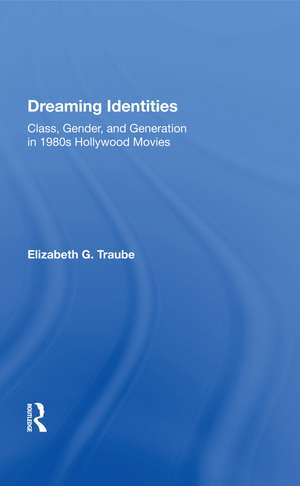Dreaming Identities: "Class, Gender, and Generation in 1980s Hollywood Movies"
Autor Elizabeth G. Traubeen Limba Engleză Hardback – 7 iun 2019
Preț: 766.26 lei
Preț vechi: 1103.97 lei
-31% Nou
Puncte Express: 1149
Preț estimativ în valută:
146.63€ • 153.40$ • 121.80£
146.63€ • 153.40$ • 121.80£
Carte tipărită la comandă
Livrare economică 02-16 aprilie
Preluare comenzi: 021 569.72.76
Specificații
ISBN-13: 9780367004316
ISBN-10: 0367004313
Pagini: 220
Dimensiuni: 146 x 229 mm
Greutate: 0.57 kg
Ediția:1
Editura: Taylor & Francis
Colecția Routledge
Locul publicării:Oxford, United Kingdom
ISBN-10: 0367004313
Pagini: 220
Dimensiuni: 146 x 229 mm
Greutate: 0.57 kg
Ediția:1
Editura: Taylor & Francis
Colecția Routledge
Locul publicării:Oxford, United Kingdom
Cuprins
Credits -- Introduction -- The Return of the Repressed: Lucas and Spielberg’s Temple of Doom -- Redeeming Images: The Wild Man Comes Home -- Secrets of Success in Postmodern Society -- Transforming Heroes: Hollywood and the Demonization of Women -- Who Will Do the Caring? Domestic Men and Independent Women in the Movies
Descriere
In this book Elizabeth Traube argues that over the course of the 1980s, Hollywood participated in a wider move by mainstream political and social forces that attempted to absorb and contain critical cultural currents by rehabilitating images of masculine authority. At the movies we saw parallel construetions of wild, antibureaucratic warrior-heroes and smooth, seemingly rebellious tricksters adapted to the corporate order. We saw the demonization of the independent woman and the complementary formation of the nurturing father as her adversary. The author relates these representations to two cultural narratives of long duration—the American frontier myth and the myth of success, or the American dream, both of which also figured prominently in the rhetorical themes of Reagan-era politics. Utilizing structuralism, Marxism, feminist object relations psychoanalysis, and neoformalist film criticism, Traube emphasizes specific aspects of cinematic representations of gender and authority to explore the relationships between culture and politics. Unlike other feminist critics of “patriarchal Hollywood,†she stresses the multiple, competing versions of masculinity and femininity constructed in Hollywood movies and the different class positions of their primary, intended audiences. Attention to particular forms that cultural narratives assume in changing circumstances gives Traube’s film analyses a unique sociohistorical dimension, while her focus on narratives used by political elites as well as by moviemakers reveals significant variations in ideology production in different sites.
